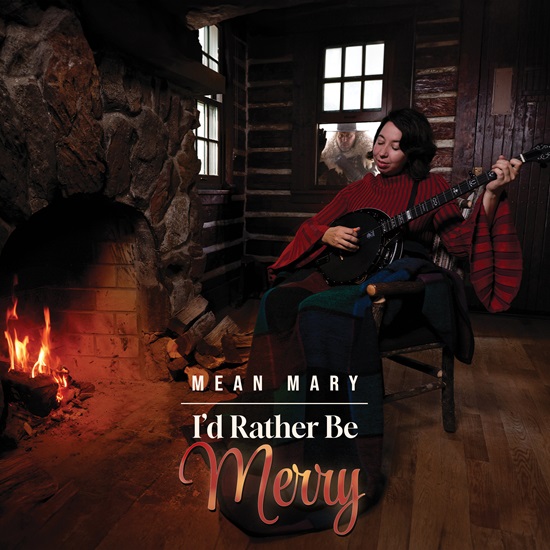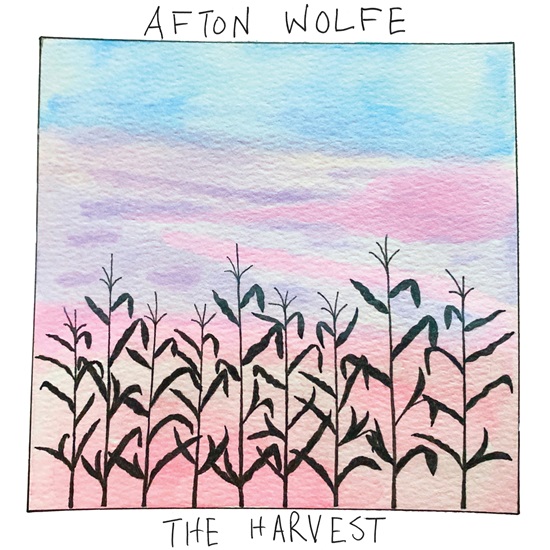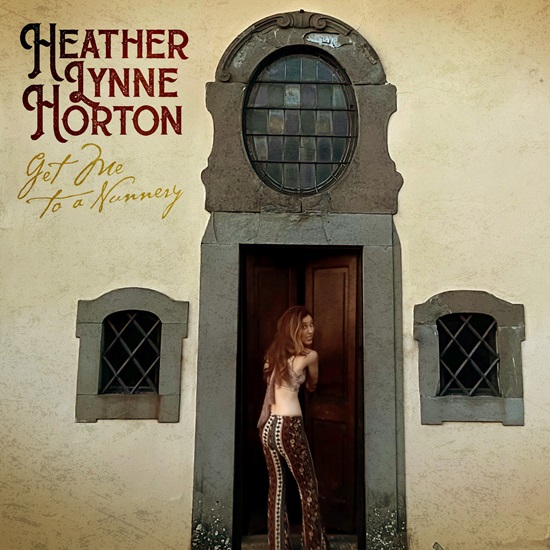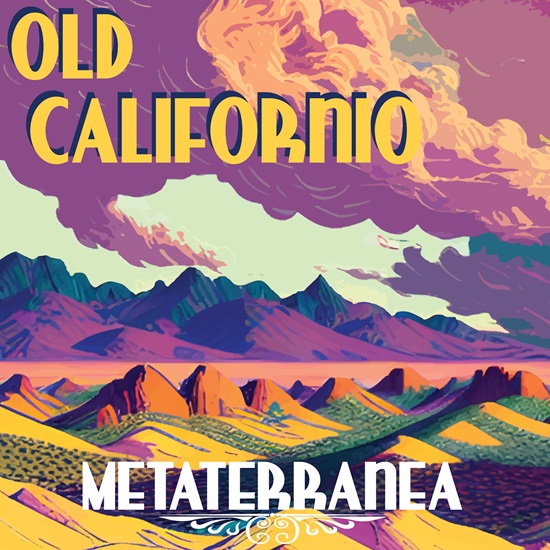
I suspect this is the only Christmas album we’ll be reviewing this year so I’m happy to say that it’s an interesting and varied piece of work. ‘I’d Rather be Merry’ is Mean Mary’s nineteenth album and it applies her usual talents of banjo picking, pure and clean vocals, and a certain amount of songwriting, to a Christmas theme. As always, it’s a combined effort with her brother Frank and brings a certain amount of humour associated with the brother/sister dynamic as well as superb musicianship.
The album is an interesting combination of traditional Christmas carol settings with contemporary elements and a bit of bluegrass thrown in for good measure. ‘I Saw Three Ships’, which opens the album, has a jaunty, contemporary feel with Mary’s trademark clean enunciation, lovely harmonies and the almost obligatory banjo solo, while ‘Jingle Bells’ starts as a traditional carol before a fiddle solo morphs it into a bluegrass setting. The interpretations of the Christmas standards are varied and interesting and enjoyable listening, but it’s the originals that really create the mood of the album with Mary’s characteristic humour and humanity. There are two humorous songs and the album’s closer ‘Ding Dong Day’ which we’ll get to shortly.
‘Cardboard Box’ is a fairly typical humorous Mean Mary song with a Christmas theme involving accidental violence against a partner while ‘I’d Rather Be Merry’ features verbal sparring and wordplay around the names of the siblings Frank and Mary. And back to ‘Ding Dong Day’, which is a previously released Mean Mary song that has a particular relevance in 2023 with its references to over-commercialisation of Christmas and pressure on ordinary people to spend to excess to celebrate a religious holiday.
‘I’d Rather Be Merry’ is released on Friday December 1st on Woodrock Records (WDRK – 4305)
Here’s the video for ‘Cardboard Box’ (don’t try this at home folks):

If anything’s predictable about the work of Afton Wolfe it’s the unpredictability. He has such a wide range of references and influences that you never know what’s around the next corner. The first surprise about ‘The Harvest’ is that there are no Afton Wolfe originals. The second surprise is that all of the songs are written by his father-in-law L.H. Halliburton so the album’s all about performance and interpretation of someone else’s songs, bringing all of his influences into play. Afton’s gravelly baritone serves all seven songs on this project perfectly the slightly sinister ‘Hello, Mr. Wolf’ – more about that later.
The album opens with ‘The Harvest’ which bounces along with hints of Van Morrison’s ‘Bright Side of the Road’ to put forward the idea that the year should begin in the fall with the harvest, rather than in spring with the sowing. ‘New Orleans Going Down’ has an unsurprising Dr John feel with the full band (including piano, of course). The vocal delivery echoes the rising of the flood water, becoming more impassioned with each chorus as the water levels become more dangerous. The next two songs get to the heart of Afton Wolfe; if you threw the DNA of Bob Seger and Tom Waits in a blender, you would get something close to Afton Wolfe vocally and stylistically.
The gospel-tinged ‘Lost Prayers’ with piano and fiddle fills evokes the classic mid-tempo Seger song, while ‘Hello, Mr. Wolf’ with its gruff spoken lyric and its off-kilter sparse arrangement and comparison of the wolf with human animals echoes Tom Waits at his most raw. The next two songs both look back in terms of style. ‘Till the River No Longer Flows’, with its message of persistence in the face of adversity has a big Southern rock sound in the good old Lynyrd Skynyrd style, including the obligatory extended guitar solo to the finish. ‘Mississippi’ has Afton exploring his soul/Stax roots with horns and piano triplets as he delivers L.H. Halliburton’s message to the state that mirrors Neil Young’s seventies message to Alabama. The album closes with the very lo-fi ‘Here to Stay’ exploring loneliness over a stuttering, reverbed piano backing saturated with tape hiss. It’s very evocative, bordering on disturbing.
‘The Harvest’ is an interesting project. Afton Wolfe doesn’t shy away from covers and interpretations, but covering seven songs by the same writer is a different challenge altogether and he absolutely aces it with his usual variety of styles and distinctive vocal delivery. Whatever Afton Wolfe tackles, you know it’s going to be interesting.
‘The Harvest’ is out now on Grandiflora Records.
Here’s the official video for ‘Lost Prayers’:

‘Get Me to a Nunnery’ is Heather Lynne Horton’s third album, following 2012’s ‘Postcard Saturdays’ and 2017’s ‘Don’t Mess with Mrs Murphy’. You might think that’s a fairly relaxed pace, but she has had other priorities, including raising her daughter and collaborating with her husband, Michael McDermott, on his solo and Westies albums. She’s even done a bit of touring with Michael as well. As you might expect, Michael features heavily on the album along with other collaborators like Will Kimbrough, although the concept, production and direction of the album are purely down to Heather.
There’s a theme running through the album which is strongly hinted at by the title. It’s the oppression of outsiders and minorities; the ones who don’t have the power to challenge when they’re told “That’s just the way it is”. There are some production and musical themes that run through the album as well. There’s an overall dreamy, ethereal feel that’s partly created by Heather’s layered lead and backing vocals that hint at sixties-era Marianne Faithfull, particularly on the album’s opening song.
‘After All This Time’ is slightly uncharacteristic in that underneath Heather’s vulnerable vocal the song builds up to a Spector-like wall of sound arrangement as it tells the story of a relationship that’s survived everything life can throw at it.
The two most vehemently anti-oppression songs on the album both feature Heather’s violin playing. ‘Ten Times’, with its lead vocals panned left and right deals with difficulties women find when the have to work ten times as hard as men to succeed and ‘Call a Spade a Spade’ with a sparse, almost sinister arrangement enhanced by the occasional single sour piano note as it highlights the racism that is still with us almost seventy years after Rosa Parks refused to give up her seat on the bus.
‘You Said So’ and ‘Take Off’ both have an autobiographical flavour, with the latter metaphorically linking air travel with a career in the music business highlighting the conflict between family and professional life; you can’t give one hundred per cent to both. The album’s final piece, ‘Lin’s Never-Ending Song’ is a condensed classical string quartet, hinting at Bach, with several movements and various tempi and techniques, including a pizzicato passage and lots of counterpoint that demonstrate Heather’s violin and arrangement virtuosity. It’s a lovely way to finish the album.
The dreamy soundscapes of ‘Get Me to a Nunnery’ create a seductive and subversive framework to soften you up before Heather delivers the subtle lyrical punches. The album was inspired by and is dedicated to Sinead O’Connor, who died just as the recording was completed; it’s a fitting tribute.
‘Get Me to a Nunnery’ is out now on Pauper Sky Records (PSR015).
Here’s the video for ‘After All This Time’:
As an added bonus, here’s a shot of Heather from her UK tour with Michael McDermott in 2017:


The longer you listen to ‘Metaterranea’ the more you realise what a challenge it is to pin down Old Californio to any given style. There are elements of country, elements of straight-ahead rock and even a bit of jazz thrown in. What you can be certain of is that the songs are well-crafted and the playing is superb throughout. The choice of songs to top and tail the album shines a light on the band’s influences and the musical journey taken by the ten songs.
The album opens with a tribute to El Camino Real (definitely not the King’s Road in Chelsea) and the people who gather in the bars in the towns along the old highway. It’s a song that harks back to the analogue and organic era of the seventies (there’s even a lyrical reference to “The lotus eaters and the luddites”) and great bar bands with musicians playing guitars, keys, drums and bass as opposed to sequencers, loop stations and laptops. Like the rest of the album it’s more about the feel than the technical aspects.
The album takes us on a journey, through all of its twists and turns to the final song ‘Just Like a Cloud’ which is a lyrical and musical exploration of dissolution. Lyrically it’s all about the thought of returning to the ecosphere after death, while musically it starts as a solid rock arrangement with guitar and electric piano before an extended guitar solo morphs away from rock territory into atonal freeform jazz to represent the random scattering of fragmented remains.
The name Old Californio is entirely accurate. Songwriter Rich Dembowski is an old-school melancholy West Coast troubadour with dreamlike songscapes and lyrical references to evanescence, mythology (Sisyphus) and even Holy Communion. The musical settings also reflect the late sixties/early seventies vibe with hints of The Band and the rockier Neil Young material. It’s loose but with a nice swing. If there’s one song that encapsulates the outsider status of Rich Dembowski, it’s ‘Weeds/Wildflowers’, which sees the outsider as the weed. As gardeners will tell you most weeds are just plants that grow where you don’t want them.
‘Metaterranea’ is very much a back-to-basics album where the focus is on creating settings that emphasise the message of the original and unusual songs without any unnecessary studio trickery – just great arrangements and great playing. I’ll take that any day of the week.
Here’s the album’s opener, ‘Old Kings Road’:


